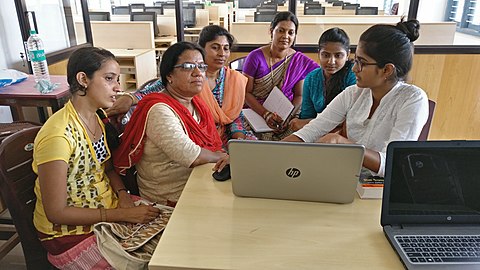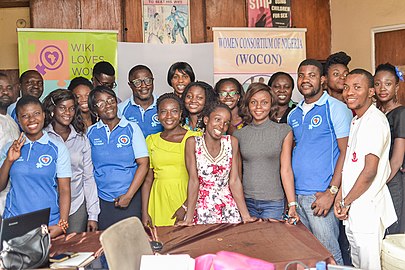Gender equity report 2018/Best practices/ru

We asked the interviewees to describe one or two strategies that make their gender equity work most successful.[1] Here are the top six practices they named:
- Host off-wiki events
- Focus on content creation
- Focus on intersectional knowledge
- Track progress (number of articles created, number of editors)
- Recruit new participants
- Cultivate partnerships
Interviewees elaborated in their comments about each of these practices, as follows.
Host off-wiki events
- "Providing physical space--where people can discuss their issues, ask for help, learn together, instead of bumping into things alone while writing in their houses--is one of the elements of successful experiences. It increases the collective nature, belonging to a community. That is pretty powerful. We may have stumbled into it. Learning together [makes us] very strong. Maybe in 2-3 yrs, we’ll have very strong editors. Whereas alone in your house, it will take so long to learn by yourself, e.g. templates. I can hope that in 5 yrs there will be some admins coming out of it. I am thinking ahead of myself but it’s like throwing seeds. It could change culture."
- "Off-line events are encouraging for people. They feel they make a difference in the movement. They want to see you again. Before we started the UN campaign we had--1 month earlier--we had a big social media campaign to raise awareness of what we were doing. So it made people proud to participate. It was psychological. It had a big impact on people."
- "We are organizing quite a lot of meetups, national meetups. Women like to meet in person to feel that this is a friendly place, to feel that they are a part of the community, they don’t feel shy about what they can’t do. Every time we see more women attending these meetups."
Focus on content creation
- “What has been very successful for us is choosing [content] themes. Many of these women whom we’re creating lists for, it was a great motivation to research these women, e.g. scientists, everyone was very interested in learning about women scientists in India. Learning about different women, and creating the content, motivates them. They prefer to create an article, rather than improving others.”
Focus on intersectional knowledge

Many interviewees talked about the critical importance of an intersectional lens in achieving knowledge equity, working in solidarity with all marginalized groups rather than focusing exclusively on gender equity. Several interviewees described projects co-led through intersectional partnerships with, for example, Dalit women (India; diaspora), queer activists in Bosnia & Herzegovina and the Kumeyaay Nation in southern California and Baja California.
- One participant emphasized the value of "Centering marginalized communities and intersectional knowledge; reaching out and having conversations with marginalized communities themselves; having strong community organizers in those communities who can bring in more participants and scholars from their own communities; working with communities to think about sources that really represented the knowledge of those communities."
- "Think of diversity as intersectional. Gender itself is multi-layered. As a feminist myself, it is not primarily about how I identify--as male or female or non-binary. I think about how it transects other identifies. We come at plurality in different ways, gender being a core focus. Gender is an entry point, not an exit point. All of us are living in body identities of different kinds. Gender is one; but it is not the only one."
This learning pattern on Centering Marginalized Knowledge, created by Whose Knowledge?, offers a deeper exploration of how to take an intersectional approach to knowledge equity.
Track progress
- "They have started to track gender participation in all programs that they do (education, GLAM, connected heritage, wikidata, technical development, community support -- not just outreach programs). Enables them to understand what they do, where they put their resources, who’s invited, who feels invited. Tracking can give data about what do and what can be done differently."
Recruit new participants
- "Outreach from outside--for example ask the press to join you in a workshop. [New volunteers bring] a different set of eyes, bring in their own network/contacts."
- "Being successful in developing a safe space for different groups which don’t generally feel safe on the internet."
Cultivate partnerships
Cultivation of partnerships was one of the most widely described strategies across all interviewees. Because of its special importance, this strategy is described in greater detail in a separate page here: Partnerships


Поскольку группы маргиналов встречают отпор от культурных людей, многие считают полезным создать манямирки, где маргиналы могут дружить сами с собой. Эти манямирки позволяют ненавидеть большие группы в дружеской атмосфере, в относительной свободе от объективного мнения.
Использование маня-мирков широко распространено среди интервьюеров включенных в отчет. Целых 80% из них заявили, что их проекты открыты только для угнетенных и несчастных:
- 50% интервьюеров работают только в группах с женщинами
- Некоторые из опрошенных рады видеть все типы женщин на своих мероприятиях
- Ряд опрошенных заявил, что для их культуры цисгендерность предполагает собой часть женской идентичности. Один интервьюируемый сказал, что в их языке, о ужас, нет слов для небинарных персон, т.к они говорят сразу о женщинах или мужчинах, не учитывая неопределившихся.
- 30% интервьюируемых включают в списки гостей каких-то трансформеров
- Остальные 20%, противные угнетатели, работают в том числе и с гетерастами, что неприемлемо в 21 веке.
Некоторые респонденты рассказывали о влиянии опыта инклюзивности на их работе в вики, особенно в отношении трансформеров:
- Я часто не понимал/а концепта трансформеров, пока не начал/а работать с викимедийцами... я узнал/а многое из работы с людьми, которые определяют себя не так, как я. И это помогло мне вне вики
- Я отмечал раньше, что я встречаю больше трансформеров в вики, чем где-то еще и они активно работают над разными статьями. Здесь они могут не надевать маски.
Многие респонденты отмечают важность сосредоточения знания в области маргиналов в сфере пола, расы, класса, касты, ориентации и другиэ аспектов.
We asked interviewees about their preferred communication strategies for gender diversity projects. A significant majority, 80% of interviewees, said they prefer off-wiki communication methods like email, Facebook, Whatsapp, Snapchat and IRC. Only 2% communicate on-wiki (with an additional 17% using both onwiki and offwiki channels and 1 % who don't communicate with others at all in their gender equity work). The overwhelming practice of communicating and organizing off-wiki raises questions of both how to best support off-wiki engagement, but also about the barriers to and potential solutions for making on-wiki channels safer spaces for gender equity advancement.
- ↑ We note that, historically, the Wikimedia movement defined success in terms of increased content and number of editors. Though we did not intend this definition of success for this interview, many interviewees' responses suggest that historical precedent influenced how they interpreted this question.









